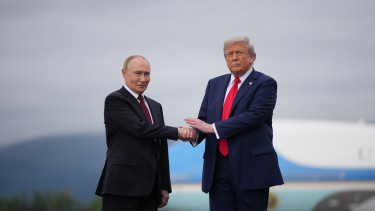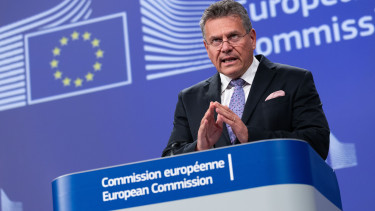Hungary to receive new Covid vaccine rather late, procurement document reveals oddities

All Covid vaccines in Hungary expired at the end of August, while the number of coronavirus infections has been rising, with almost a quarter of samples tested on the 42nd week showing the presence of SARS-CoV-2, and almost half of the 196 people hospitalised with severe acute respiratory infection (SARI) tested positive for Covid.
When the news portal asked the NNGYK in early September about the expiry, they confirmed it and said they were working on procuring new vaccines, without telling when and how many doses would be purchased.
Although they have not communicated anything in this regard every since, the public procurement database reveals that a new tender has been invited.
Although it is an open tender, the only producer meeting the conditions is Moderna.
This is interesting because last year the Public Procurement Arbitration Panel imposed a fine on the NNGYK for tailoring its procurement to Moderna.
Refusing this, ordering that...
Here's a brief history of Hungary's latest 'vaccination campaign'
- Péter Takács, state secretary in charge of health care, said last December that the cabinet was to buy 700,000 to 800,000 doses of COVID-19 vaccines adapted to the XBB.1.5 Omicron subvariant.
- Telex looked into the matter and spotted in the procurement documentation that the order was actually for 72,000 to 92,000 doses in the value of HUF 2 billion.
- The seller was to be Moderna, with the state secretary saying that Pfizer had not even made a bid.
- As it turned out Pfizer refrained from bidding not only because it was forced to take Hungary to court for the country’s failure to pay for three million doses of BioNTech-Pfizer’s coronavirus vaccines worth some EUR 60 million, but also because the tender itself was tailored specifically for Moderna’s shot.
- The cabinet refused to take deliver of Pfizer's vaccines citing the war between Ukraine and Russia, and used the very same argument for the rushed procurement of Moderna's Covid jabs.
- The procurement irregularities led the Public Procurement Arbitration Panel to fine the NNGYK HUF 14 million.
A closer look reveals the tender is not so open after all
The NNGYK is requesting bids in three tranches, for three different age groups:
- 16 years and over: 100,000 doses, plus an option for another 150%, for a total of 250,000 doses;
- 6 months to 11 years: 800 doses;
- 12 to 16 years: 200 doses.
So, of the doses specifically for children, 1,000 are expected to be delivered, while the doses for adolescents and adults are expected to be between 100,000 and 250,000.
From the description of the three parts of the call for bids, it seems at first glance that the requirements set by the NNGYK are slightly different for different age groups. But a closer look reveals that at the end of each path, we end up with the same thing, which is that
only Moderna can meet the conditions, even though several vaccines authorised in the eu could be used.
The conditions include shots for specific age groups (see above), dosage (single-dose vials), storage (between -50°C and -15°C (-58°F and 5°F) until the expiration date), and type (recombinant DNA, protein subunit with adjuvant, mRNA).
When Telex asked the NNGYK about the expiring vaccines and the purchase of new doses , they did not say which manufacturer they planned to buy from, but they did say that they would buy from the latest type at the time, a vaccine adapted to the JN.1 variant.
On 30 April, the Emergency Task Force (ETF) of the European Medicines Agency (EMA) recommended updating COVID-19 vaccines to target the new SARS-CoV-2 variant JN.1 for the 2024/2025 vaccination campaign. JN.1 differs from the XBB family targeted by previous updated vaccines and has now surpassed the XBB variants to become the most widely circulating variant worldwide. In making its recommendation, the ETF consulted the World Health Organization (WHO), international partners and marketing authorisation holders for COVID-19 vaccines.
Timing is not exactly optimal
The timing of the procurement raises questions. There is no exact date on when the new vaccines could be delivered, but you can get a rough idea. Last year, the NNGYK launched the public procurement procedure on 21 November, and bids could be submitted until 30 November, and vaccinations could be administered from 18 December.
This time the procedure was launched on 10 October, with a deadline for bids of 11 November (the bidding phase is longer because this time the procurement is supposed to be open.) The winning bidder must deliver the full quantity without options within 15 days of the contract being signed.
All things considered,
the new Covid vaccine is realistically expected to be available in early December. The option part can be called by the NNGYK by the end of February at the latest.
Although, if all goes well, it will be possible to get vaccinated a little earlier this year than last year, the epidemic trends suggest that even this will be later than would be ideal.
"Epidemiological data from previous years have shown that the current wave of COVID-19 and the influenza pandemic do not coincide," said the Epidemiology and Surveillance Centre at Semmelweis University earlier this month.
"The autumn-winter epidemic wave of SARS-CoV-2 starts much earlier, in September, while the flu epidemic typically starts no earlier than the end of January the following year.
"While for influenza it is sufficient to vaccinate during October-November, for COVID-19 the vaccination period should be earlier in order to ensure that risk groups are protected during the widest possible period of the COVID-19 pandemic wave.
On this basis, it does not seem reasonable that the flu vaccine should become available before the Covid vaccine, when both the expiry date of the previously available vaccines and the expected evolution of the epidemic should have been known to the NNGYK for some time.
Cover image (for illustration purposes only): Getty Images









